Austin Wintory Interview: Exploring Leisure Suit Larry Reloaded, The Banner Saga, Journey

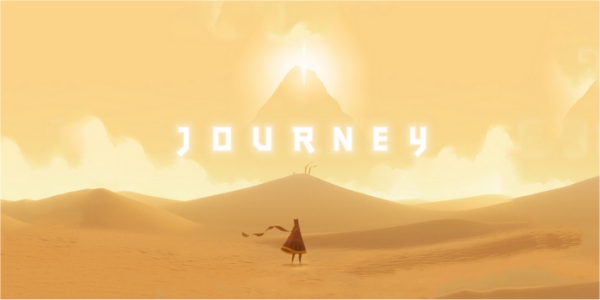
There are some people within the video game industry that make waves when they become attached to a project. We look at the project differently and react to it differently when we finally experience what they have to contribute. In this case, Austin Wintory is the sort of individual that brings unparalleled creativity to each of his musical compositions and Gaming Blend had the opportunity to explore what makes the soundtracks stand out so much for Wintory's projects.
Find out how Austin felt about being nominated for a Grammy for the impeccable score to thatgamecompany's exclusive PS3 title, Journey, as well as Austin's approach to tackling the music for Stoic Games' The Banner Saga, and how he managed to pull out all the stops for the collaborative bonus soundtrack for Monaco. Oh yeah, and we also find out a little bit more about how Wintory got attached to Al Lowe's Leisure Suit Larry: Reloaded, which is set for release on May 31st.
Gaming Blend: First up, congratulations on the Grammy nomination. That's an amazing feat for a video game soundtrack.
Austin Wintory: Thank You.
Gaming Blend: What was it like first finding out that you were nominated for a Grammy and your music was being matched up against the likes Trent Reznor, Atticus Ross, Howard Shore [for Hugo], Hans Zimmer with that impeccable Dark Knight Rises soundtrack and one of the greatest composers of all time, John Williams? That's an amazing list of names just to be nominated with.
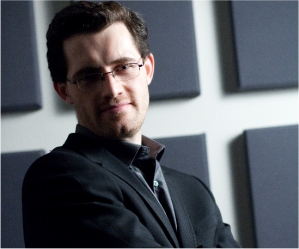
Austin: Well, as many times as I've been asked that, I still have yet to formulate a great answer. It was and remains rather surreal...especially given the context of it being a [video] game score and that whole idea...the novelty. But basically, John Williams especially, has been a hero of mine my entire life. So the notion of being a co-nominee alongside him, for anything at all, nevermind something as established and well known as the Grammys – but it really could have been the Topeka Gazette Annual Round-Up of Film Scores or something – was pretty indescribable.
It was sort of like a life-long dream that I didn't even realize that I had, because it was so far-fetched seeming. So it was pretty surreal, even now. With six months of time to digest it, it still hasn't quite hit.
Your Daily Blend of Entertainment News
Gaming Blend: Maybe many years down the road you can tell your kids or grandkids about the time you were matched up against the legends who scored the soundtracks to The Dark Knight Rises or the Girl With the Dragon Tattoo.
Austin Wintory: (laughs) Maybe so. I'm sure they'll say 'we don't care about old movies!' and they'll only want to know what's going on then.
Gaming Blend: But, do you think you could have taken home the Grammy had maybe they knocked Reznor or Williams off the list?
Austin Wintory: Oh, you know...that's all...(chuckles)...who knows? I have no shame in losing to anybody on that list, especially Trent Reznor, who obviously – via Nine Inch Nails – was very much in with the recording academy on his home field. It's much more novel for him to have won the Academy Award for the Social Network, for example, then to be nominated and/or win a Grammy for anything that he does. I think he has something like eight or nine prior nominations. My prediction going into was: Should I lose, it was going to be to [Trent Reznor]...and I was right (chuckles).
Gaming Blend: Before Journey you worked with Jenova Chen and thatgamecompany on the earlier iterations of flOw before it landed on the PlayStation 3. Heading into the soundtrack for Journey did you go back and kind of rekindle the experiences from Chen's previous games like Cloud or Flower to get an idea of how they do the zen-gaming experience, before getting into the head-space for Journey or was it just a natural progression that happened once you joined the team?
Austin: Uh, well certainly back when we did flOw – which was six or seven or eight years ago – I was familiar with Cloud and I [further] familiarized myself with Cloud. When thatgamecompany were working on Flower, I would periodically go and play test the game and check it out. And even though I didn't work on the game in any professional capacity, I did sort of check in from time to time and at the very least would kind of cheerlead in avant sorts as someone who was clearly excited about the game that they were making. And when it came time to do Journey there was no real discussion of flOw or Flower, or Cloud, so much as just the emotional goals that [Jenova] had for Journey.
You always draw on prior works that you make together, you know? And we worked on [Journey] for so long, it was about three years, so certainly within that time conversations would come up in which we would talk about flOw and Flower. By and large Journey was self-propelled. It knew where to take us and we were just sort of following it.
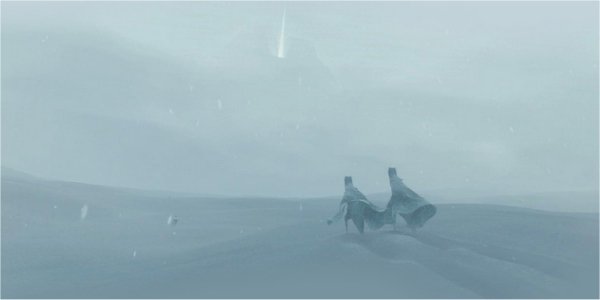
Gaming Blend: Did Chen give you any specific directions on how the music would unfold or what sort of themes he wanted from you, musically?
Austin: Jenova never gave me any musical instructions, insofar as he didn't say things like 'It would be great if there was a solo cello here, or a harp there' or anything like that. We did speak extensively about musical intensity and dramatic arts, in respect to the full span of the game. Jenova and all of thatgamecompany had very clear ideas, especially as we went along, over what the emotional progression, from the beginning to the end, needed to be. So that, of course, was regularly discussed.
But the goals that [Jenova] laid out for [the project] were abstract emotional goals. So, for example, from the beginning he knew he wanted the game to be a sort of metaphor for the human life, but modeled on Joseph Campbell's Hero's Journey. He also knew that he wanted the game to be about this multiplayer dynamic that could hope to foster a really genuine connection between two players. So, you know, digesting what that meant was the starting point and also what just drove the entire experience from beginning to end.
Gaming Blend: So how do you know how to adapt the music as you go along? Do you write it while looking at concept art or just feel your way through the process or is there extensive play-testing involved? Also, it was a real achievement for Journey, putting together that amazing track, Apotheosis, and how it lead up to the game's breathtaking climax.
Austin: Well, there's kind of a few different parts to the answer to that. First off, I play-test the game extensively while I'm composing, in the same way that while I'm scoring a film I watch the movie over and over and over again, while I'm in the process of putting together this score. No music is ever written – even something as abstract as a video capture or concept art or anything like that, it's always based around my experience actually playing the game and figuring out the music in a very moment-by-moment kind of way.
So, definitely, for Apotheosis, the music was written to wrap around the gameplay. Now, the other thing to bear in mind is that the end of the game evolved a lot through the course of those three years. The ending as everybody knows it, as shipped with the actual release of the game, only really came to being in the last couple of months. It really came sliding in, in the eleventh hour. So, the music likewise was essentially the very, very last thing I wrote in the game.
It wasn't so much 'Hey, go give it your all!', it was more like desperately trying to figure out what all the naunce of it was going to be. You know, we knew it needed to be a photo finish and be a strong ending because the game had built up pretty dramatically and we had all the moment-by-moment dramatic intensity figured out leading up to the snow and the mountains – so it was there to go from there, and it was hard to figure out.
The last thing to bear in mind also, is that when you listen to Apotheosis on the soundtrack album that is not how I originally composed it. The way it was originally composed was as interactive music within the game. So the act of putting together a soundtrack album is sort of a separate activity where I have to go in and take apart the music and put it back together again in a way that makes sense for a linear album.
It's funny because people think of Apotheosis as one piece of music, it's actually not. From my perspective it's like a dozen or more pieces of music, each of which are being dynamically controlled by the PlayStation while you're playing the game so that it feels nice and seamless. In hindsight, it feels like the experience that you had while playing the game, but the two are very different from each other.
Gaming Blend: And there was a lot of inter-linking with other tracks, sort of like Apotheosis linking directly into the end credits song in the game, I Was Born For This. (Editor's Note: These transitional techniques are sometimes called “cues” and Uncharted's Greg Edmonson also explains how they use various cues from a single song across the space of an entire game, which you can check out in this interview here.)
Austin: Yeah, I mean it certainly pretty smoothly transitions from one to the other [in the game].
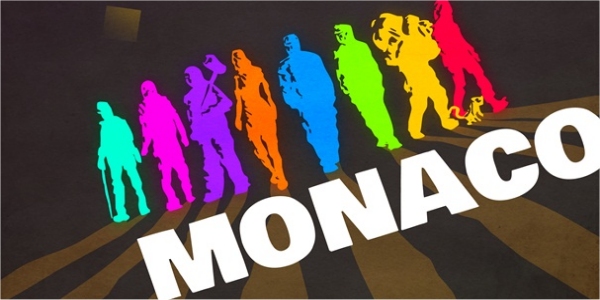
Gaming Blend: Following up on the last question – regarding the themes of Journey – how did you manage to get cellist Tina Guo on board, had you known her before working on the Journey soundtrack?
Austin: Oh, well Tina, she and I have known each other for something like, almost ten years I think. And I've written cello solos for her on many, many, many projects that I've worked on over the years. I love featuring her in what I do.
It was inevitable when I realized that cello solos would form the bedrock of [Journey's] score, that it had to be her playing them.
Gaming Blend: Now you brought Tina back and collaborated with a ton of other artists on the Monaco soundtrack, a game that's also getting high praise and was already profitable in pre-orders before it actually released. Was it your idea to bring in all these other artists or was it the idea of the designers and how do you get all these artists collaborating on an indie project where the budget is a little more constricted?
Austin: So there's two different things: the actual score in the game to Monaco is 100 percent solo piano, from start to finish, so that when you actually play the game there's always this sort of rockish and crazy, silent-era style. However, for the soundtrack release – and I worked on Monaco for two years and it duck-tailed with Journey heavily – as I was nearing the end, I was just kind of sitting and thinking one day that it would be fun to hear all this music put through the filter of other styles by various artists that inspire me.
I just started reaching out to people and before I knew it I had eleven artists doing covers in whatever styles that they do. So it was purely for album release and it's not in the game anywhere. But it was basically just an excuse to have fun and I collaborated with all of them on their individual versions and gave them feedback while they were working on [their covers] and whatnot.
Gaming Blend: And one of the things that really struck me by surprise was Mega Ran and Jermiside's 'Stick 'Em', which was such a unique, multi-genre take on the song, fusing a bit of jazz with rap.
Austin: Yeah, well the sampling for the song that I wrote – there is a song for the end of the game called 'Can't Resist' with a piano featuring a vocal from Laura Vall, and when Mega Ran was starting to produce his track called 'Stick 'Em' he was drawn to a little bit of vocal or a little bit of sample from the vocals from that song. And so, we kick it off with that [sample]. But that track is derived from the song in the game called 'Can't Resist'.
Gaming Blend: Another thing that really struck me by surprise was your affinity toward sharing content and music digitally. You seem to want to ameliorate the bridge between people enjoying your music in the game and then enjoying it anywhere else, with tracks available on YouTube and BandCamp and SoundCloud. What prompted you to take that route, given that so many other companies go in the complete opposite direction, cutting off communication and the act of sharing?
Austin: Well, the way I see it is that if you want people to listen to it and be able to share it with people, then I am continuously flattered and deeply humbled by that, and if they are in a position to pay me for it, then I would rather frame the conversation in which they feel rather invited to do that, rather than feel like I'm mandating that or guilt them into [paying]. I would rather they do it because it appealed to them and is something that they're proactively doing and not something that they feel like they have no choice in.
I feel like previous business matters in the music industry have been based around the idea of controlling channels of distribution so that if someone wants something, they have to pay for it. But that's not really why I'm interested in music as a composer, so I don't really have much use for that business model when it comes to releasing albums. If people want to pay for it – I mean, this is how I make my living, so I try to make that clear – I'm not trying to encourage piracy or something like that. But the point is: I would rather it feel more like this partnership between the audience and myself, because they're not really separable. I don't really see them as this outsider that is eating what I feed them, it's more like a shared collaboration; a dialogue between composer and listener, in which both are playing an integral part.
So yeah, when people post my music on YouTube or on my channel, or especially when people do things like make covers on their own, sort of like fan covers, I like to go way out of my way to advertise those and support those. So yeah, to me it's a wonderful new ecosystem.
Gaming Blend: Given your liberal use of sharing music with listeners, have you ever been blocked from sharing your music from companies or publishers whose soundtracks you've scored?
Austin: Not really, because by and large I control the ownership and the rights to almost every project that I've worked on, and when I don't I always make sure that I have a really great relationship with whoever owns it. Like, for example flOw and Journey are both owned by Sony, of course, but I have a great relationship with Sony and I really like them and they have a similar set of ideas and principles that I do, so we never come into conflict over these sorts of things at all. They're really wonderful.
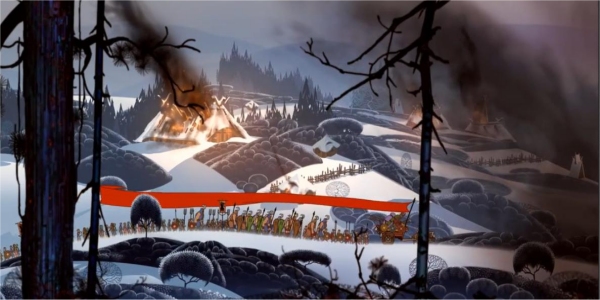
Gaming Blend: Regarding the Banner Saga...this is such a hugely anticipated game, and it would seem like this shares a lot of commonality with Journey. At what point did you become interested in the project and who approached who during the campaign to get Stoic Games' project made?
Austin: They approached me out of the blue, during their Kickstarter about a year ago. They showed me what they had going on and...partly because of what it had going on with Journey but mainly because on its own it was so compelling and had so many wonderful things about it, I immediately wanted to be involved. We worked out a deal pretty much instantly. And I've been steadily chipping away at it for about a year.
Gaming Blend: And how far along are you with the soundtrack for Banner Saga? Is it almost complete or...?
Austin: Oh, far from it (chuckles). I haven't recorded anything yet. We'll be recording a big orchestra for that game and not one note has been recorded yet, so we still have a ways to go.
Gaming Blend: Changing gears a bit but keeping with the Kickstarter theme...Al Lowe requested to bring you on to score the soundtrack for Leisure Suit Larry: Reloaded, did you have any idea of what that project was going to be like going in?
Austin: Oh of course, I played the original growing up.
Gaming Blend: Oh really?
Austin: Oh yeah, that's why I got so excited, because Leisure Suit Larry is part of a general legacy of Sierra adventure games from the 80s and 90s, for which I was a huge fan. I've played all the King's Quest games, the Police Quest, the Space Quest and Leisure Suit Larry [games]. So when they reached out to me, I was floored. I really didn't see it coming at all; I was really quite surprised but overjoyed.
It was a chance to revisit something for which I have a lot of nostalgia, and also they wanted a jazz score. Even though Monaco is a jazz score it's a very different kind of jazz vocabulary. [Larry's] jazz is more of a Las Vegas, big-band swing-jazz that I haven't really had an occasion to properly explore. So I was tremendously excited about the prospect of mining the depths of that. And Al, being the wonderful musician and storyteller that he is, I really connected with him and was just delighted to work him. He's someone that I've known about and admired from afar from like...twenty years. He was great and it was really exciting and everything was just as great as I had hoped it would be when they first reached out.
Gaming Blend: So are you interested in any other old-school franchises to score?
Austin: It's interesting because remakes and sequels aren't all that interesting to me because I would much rather be part of something new where we're carving out our own identity. Like Monaco and flOw and Journey and The Banner Saga...these are all things that have no obvious direction to go in because they're not sequels and they're not reboots and they're not remakes. That's much more interesting to me as a composer.
But in this case...Leisure Suit Larry is a bit different because that was the first thing I asked Al, I said 'there obviously was a score for the first game and we are remaking – in a very straight-forward and literal way – the first game, why are we not going to re-use the original score or dress it up and reproduce it to be a bit more modern in higher fidelity audio?' and he said 'I'd rather turn you loose and just to be creative and do whatever you want and feel no obligation to retread the path.'
So even though this was a remake of an earlier game, I was given very explicit instructions not to feel beholden to the original at all. But that's not necessarily how that would normally play out. So if you're asking what franchises exist out there that I would want to dive into, the truth is if someone called me to work on the new fill-in-the-blank franchise, I would always be happy to have a conversation with them and see if they feel like I'm a good fit for what they're trying to achieve. But I would never go seek that out because I would rather go find something new.
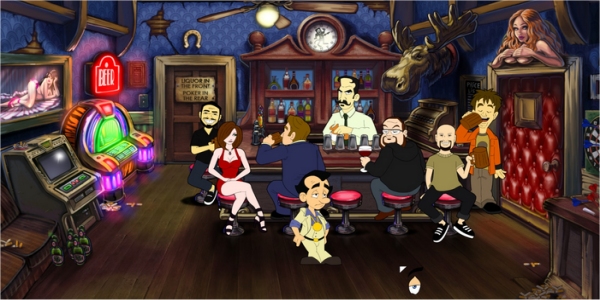
Gaming Blend: Does that mean you took Leisure Suit Larry and created your own theme for the game or...?
Austin: Actually that is um...no. Al's original theme from 1987, which was featured in every Leisure Suit Larry game that has ever been made – that was very important to me. That would be like if JJ Abrams called me to score the new Star Wars, of course I would want to use John Williams' themes. Same idea here.
I very much wanted to use Al's theme as the genetic basis for my score. So you hear [Larry's] theme reflected and toyed with throughout the entire game. I treated it very faithfully. I do it in my own style and in some cases it's quite weird, but it's always based around Al's actual tune.
Gaming Blend: So the game is completely playable and you've been play-testing it quite a bit?
Austin: Oh definitely, I've been play-testing it for like the last six months or so. And it's literally running on my computer right now, just paused. So, definitely yes.
Gaming Blend: And you've completed all the music for the game?
Austin: For Larry? Yes, I'm 100 percent finished other than the fine-tuning of the in-game implementation.
Gaming Blend: So is there a particular roadblock for certain games or crafting music for certain projects, making it easier or harder depending on the genre or style of the game?
Austin: Not really. There's not one answer to that. Every project is very different from one another, because the circumstances are always very particular to that game and governed by the personalities of the people making that game, which is always different from one person to the next.
The challenges that come up for any particular game are always just organic to the kind of work you're trying to do. It's obviously very difficult to make a good game or write good music. So you're always going to hit various obstacles and roadblocks, but they're not systematic to a particular type of game or games in general, it's just that creativity is hard; brutally difficult and unforgiving. But that's sort of why we do it, it's a big part of what drives us.
Gaming Blend: So are there any other upcoming gaming projects you're allowed to talk about or are you just working on what we know of so far?
Austin: I think between the Banner Saga and the impending release of Leisure Suit Larry that covers the other things that I can talk about.
I can tell you that I scored a short film a couple of months ago called The Forge, and that's being released [May 8th]. And it's a beautiful and extremely emotional film about a metaphor for internal conflict dealing with depression, because what happened is, this guy, his sister rather unexpectedly committed suicide and she left him money and he used that money to make this short film in her honor. And so I wrote the music and Tina Guo plays cello and it also features vocals by a singer who is pretty well known in her own right, her name is Maluka and she has a bunch of wonderful videos on YouTube, including a cover of the Bard Song, Dragonborn from Skyrim. Her cover has something like 10 million hits and she did one of the covers on the Monaco bonus album, and she and I have become rather close, so this music that I wrote heavily features her voice.
The short is only five minutes long and it's a very short, short-film. So I'm releasing the music as a single, just the one track of all the music in the short will be online, and 100 percent of the sales are going to a suicide prevention charity...and hopefully make some improvements in people's lives that perhaps are struggling with things that they don't know how to deal with.
Gaming Blend: Well we appreciate you taking time out to talk and good luck with your endeavors and upcoming projects
Austin: Thank you. It was actually my pleasure.
You can learn more about Austin's projects by visiting his official website Also there's a free track available for you to listen to from the Leisure Suit Larry: Reloaded game right here.
Staff Writer at CinemaBlend.

